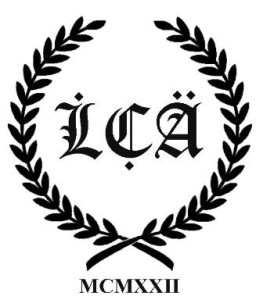|
The Bridge Builder
An old man going a lone highway
Came in the evening, cold and gray,
To a chasm vast, both deep and wide.
The old man crossed in the twilight dim;
The swollen stream was as naught to him;
But he stopped when safe on the farther side
And built a bridge to span the tide.
“Old man,” said a fellow pilgrim near,
“You are wasting your strength in labor here;
Your journey will end with the closing day,
You never again will pass this way.
You’ve crossed the chasm deep and wide
Why build you this bridge at eventide?”
The laborer lifted his old gray head,
“Good friend, in the path I have come,” he
said, “There followeth after me today
A youth whose feet must pass this way.
This chasm which has been naught to me
To that young man may a pitfall be.
He, too, must cross in the twilight dim.
Good friend, I am building this bridge for him.”
– Will Allen Dromgoole
Greetings, Friends!
When Past President Edward Krugman handed me the Lawyers Club of Atlanta gavel last May, I told you then I had some pretty big shoes to fill. And that is where I find my thoughts now as I pen my last President’s Message as your President…contemplating the shoes of others I have stood in during the last 27 years of practicing law.
I am here standing in the shoes of so many other lawyers who led and cleared the path for me and for you. As we gather in May to honor our 50-year members, which has always been one of my favorite meetings, it is appropriate that we consider those who blazed the trail before us, branch by branch, so that our path might be just a bit smoother. Here are just a few examples of Georgia Trailblazers, in whose shoes I have stood the last 27 years:
Chief Justice Carol Hunstein-1st woman Chief Justice of the Georgia Supreme Court. Justice Hunstein contracted polio when she was two, survived her first bout of bone cancer at age four, lost her mother at age 11, married at 17, became a mother at 19, and a single mother by age 22. That same year, Justice Hunstein lost a leg to cancer and was told by doctors she had only a year to live. But that didn’t stop her from getting her law degree. She opened a private law practice in Decatur in 1977 and, spurred on by a trial judge who repeatedly called her “little lady” in open court, Justice Hunstein decided to run for the bench. She defeated four men and in 1984 became the first woman elected to the DeKalb County Superior Court. She has served on the Georgia Supreme Court since 1992.
Judge Anne Workman: When she graduated from Emory Law School less than ten percent of the class of 1972 – one hundred in number – were women, as were less than four percent of all lawyers in the nation. The downtown law firms came to the Emory campus for employment interviews with the male students, but would not interview the women students at all. Judge Workman’s first attempt to get a legal job after law school was fruitless, but she recounted it very humorously. She had always loved criminal law and wanted to be a prosecutor when she graduated from Emory. She approached the district attorney at the time about employment in his office. Judge Workman recalled: “He told me in a very matter of fact manner that there were some places a woman did not belong and that a courtroom was one of them. But that was alright because I could have a baby and he couldn’t. It was not the reasoning I had hoped to hear; but in one way it was helpful as it provided a considerable amount of focus and direction to me to prove him wrong. You take motivation where you find it. It took twelve years, but in 1985 when I was sworn in as a state court judge, I saw him and reminded him of our long-ago conversation. I remarked that I must belong in a courtroom now because it had my name on it.”
Sr. Judge Horace Ward– In 1979, Judge Horace Ward became the first African American federal judge in Georgia, having been nominated by President Jimmy Carter. He had previously served in the Georgia State Senate and as a State Court and Superior Court judge in Fulton County. Since 1993, Judge Ward served the Northern District of Georgia in senior status. He is also well known in Georgia history from his efforts to gain admission to the then-segregated University of Georgia Law School in the 1950s. For years, the Board of Regents denied Judge Ward admission to the law school, stating that the fact that no black had ever been admitted to the university was merely coincidental. Meanwhile, the Board of Regents decided to “modify” the admissions criteria by requiring that candidates take an entrance exam and that they get two additional letters of recommendation-one from a UGA law school alumnus and the other from the superior court judge in the area where the applicant resided. Judge Ward filed suit against the Board of Regents to gain admission, which, after years of delay, was eventually dismissed on the basis that Judge Ward had “refused” to reapply under the new admissions guidelines (which Ward’s attorneys had argued was yet another ploy to keep Ward out). Judge Ward decided not to appeal and attended law school at Northwestern University, from which he graduated in 1959. In what can only be described as a moment of poetic justice, Judge Ward was a member of the legal team representing Charlayne Hunter and Hamilton Holmes when they were admitted as the first African American students at UGA, thus ending 175 years of segregation at the university.
Judge Clarence Seeliger– Judge Seeliger was a trailblazer for racial justice and equality. He hired the first African American employee of DeKalb County State Courts and courageously removed the Confederate flag from his courtroom at great personal risk. Judge Seeliger made it clear that no one, not even judges, was above the law. Dr. Martin Luther King, Jr. said, “There comes a time when one must take a position that is neither safe, nor politic, nor popular, but he must take it because conscience tells him it is right.” Seeliger’s life embodies that principle.
Each time a barrier is removed in the leadership of our courts, our Legislature, our profession, a door opens to a new generation of potential great trailblazers, which might include the next Horace Ward, the next Carol Hunstein, the next Clarence Seeliger or the next Anne Workman. Some very big shoes, indeed.
Please be sure to join us on Wednesday, May 20, as we honor our 50 year members who, also, have some pretty big shoes for us to fill. Come and celebrate 17 lives well lived and 17 legal paths blazed. Our 50-year members stand as beacons to promote the cause of justice, to respect the rule of law and to protect the rights of all citizens of the State of Georgia. In this example we should all take pride.
A Rising Tide Lifts All Boats,
Robin Frazer Clark,
President
2014-15 |

 Atlanta Injury Lawyer Blog
Atlanta Injury Lawyer Blog




















